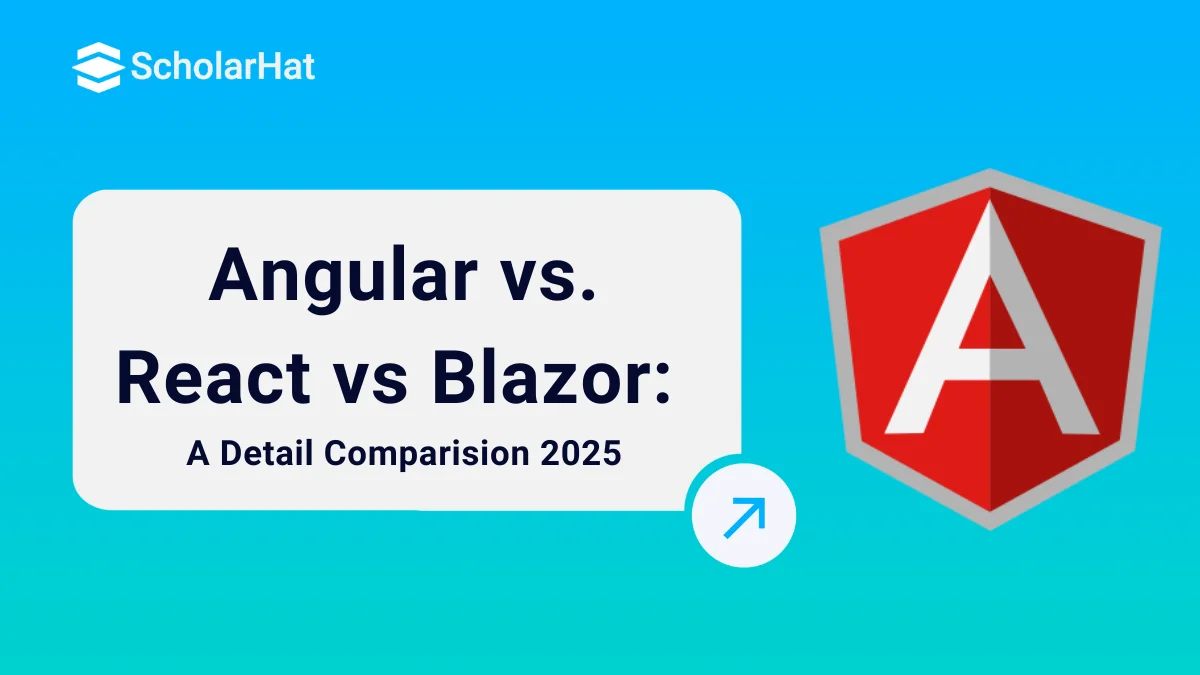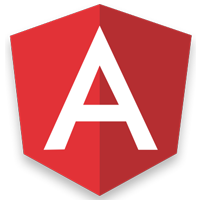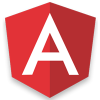30
JanAngular vs. React vs Blazor: A Detail Comparision 2025
Angular vs. React vs. Blazor: An Overview
Explore the comparison in our Angular Tutorial. Choose the 'best' framework – Angular for large projects, React for flexibility, and Blazor for.NET developers. Consider complexity, experience, and preferences in our Angular Training.
What is Angular Framework?
An angular framework is extensively used as a Google-backed TypeScript framework for creating dynamic, interactive web applications, particularly single-page applications (SPAs). It is renowned for its component-based architecture, declarative templates, dependency injection, and robust tooling support, which makes it perfect for large-scale projects.
Benefits of Angular Framework
- The component-based architecture and declarative templates of Angular facilitate code organization, encourage reusability, and ease the maintenance of huge systems.
- Angular employs TypeScript, a language that offers improved tooling, IDE integration, and type safety for a more efficient development process.
- Performance is enhanced by Angular's change detection techniques, virtual DOM, and ahead-of-time (AOT) compilation, particularly in large applications.
- Concerning angular routing, forms, animations, testing, & much more, Angular provides an extensive range of frameworks, tools, and community support.
- Angular can be used to develop native-looking mobile apps with tools like Ionic & Angular Material.
- Angular apps can be search engine optimized with server-side rendering (SSR), appropriate routing, and metadata management.
Read More - Angular Interview Questions for Freshers
What is React Framework?
A JavaScript package called React is used to create user interfaces quickly and effectively. Its main goal is to decompose user interfaces (UIs) into reusable parts that control their rendering and state. Better performance, a more seamless user experience, and more organized code are the results of this.
Benefits of React Framework
- Create reusable, modular user interface components to ensure a productive, orderly development process.
- The virtual DOM of React optimizes updates, resulting in user interfaces that are responsive and dynamic.
- To begin using React, one only needs a basic understanding of JavaScript, making it accessible to developers of all skill levels.
- Gain access to a wealth of materials, a sizable development community, and a vibrant tool and library environment.
- Use React Native and React Native for Desktop to create desktop, mobile, and online applications.
- React can be rendered on the server to improve search engine optimization and speed up page loads.
- The architecture of React encourages code reuse and facilitates the management and updating of huge projects.
What is the Blazor Framework?
Blazor is a web framework that enables you to create server-side or WebAssembly-based interactive web user interfaces (UIs) using C# rather than JavaScript. It is a fantastic option for .NET developers who wish to create web apps because it is a members of the .NET family.
Benefits of Blazor Framework
- Use C# to write front-end and back-end code without having to transition between languages.
- Utilize the extensive collection of .NET libraries and development tools to create online applications.
- Code reusability is encouraged by the seamless sharing of components and code between the client and server.
- Blazor WebAssembly executes C# code directly in the browser, providing near-native performance.
- Blazor is easy for C# developers to get started with because of its well-known syntax and tools.
- Blazor Server offers server-side rendering for improved SEO and initial load efficiency.
- Use Blazor to create PWAs for improved user experiences and offline capabilities.
What is the best framework between Blazor vs Angular vs React vs Vue?
Unfortunately, there isn't just one "best" framework because they're all excellent in different aspects.
- Blazor: Perfect for server-side rendering, C# enthusiasts, and .NET developers.
- Angular: Because of its structure, it's perfect for big, complex projects.
- React: Well-liked and adaptable, with large libraries and an active community.
- Vue: Easy to use and suitable for beginners; ideal for smaller projects & gradual acceptance.
Comparison Table for Blazor vs React vs Angular
| Feature | Blazor | React | Angular |
| Programming Language | C# | JavaScript | TypeScript |
| Framework Type | Full-stack (client-side & server-side) | JavaScript library (view layer only) | Full-stack framework (client-side & server-side) |
| Learning Curve | Moderate (familiar with C#/.NET) | Easy (familiar with JavaScript) | Moderate (familiar with TypeScript & MVC patterns) |
| Performance | Initial load faster (no separate JS file), potential slowdown on complex updates | Fast updates with virtual DOM, potentially slower initial load | Good performance, balanced for complex applications |
| Application Size | Can be larger due to the .NET runtime download (WASM) | Smaller initial size can grow depending on dependencies | Moderate size varies based on the features used |
| Community & Resources | Growing, but smaller than React & Angular | Largest community and resource pool | Large community and extensive resources |
| Component-based | Yes | Yes | Yes |
| Data Binding | Two-way binding | One-way data flow (downward) with virtual DOM | Two-way data binding |
| Routing | Built-in | Requires additional libraries | Built-in |
Summary
Angular's hierarchical foundation makes it suitable for large-scale, intricate projects. React is well-liked for smaller projects and startups since it is versatile. For.NET developers working with C# and the .NET framework, Blazor is excellent. When making your decision, take performance, learning curve, and community resources into consideration.
FAQs
Take our Angular skill challenge to evaluate yourself!

In less than 5 minutes, with our skill challenge, you can identify your knowledge gaps and strengths in a given skill.












